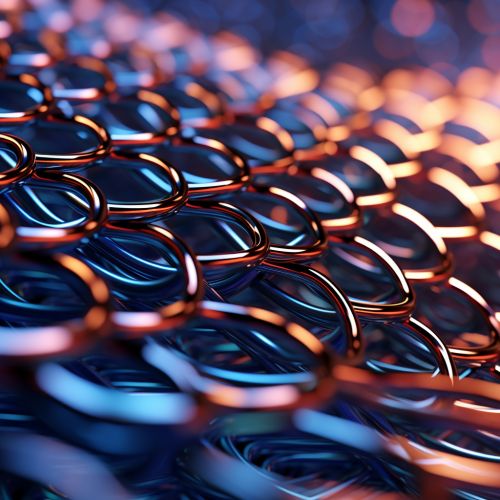Topological Insulators and Quantum Computing
Introduction
Topological insulators are a unique phase of matter that have garnered significant attention in the field of condensed matter physics due to their intriguing properties and potential applications in quantum computing. These materials are insulators in their bulk but possess conducting states on their surfaces or edges, a phenomenon that arises from their non-trivial topological nature.
Topological Insulators
Definition and Properties
Topological insulators are materials that behave as insulators in their interior but whose surface contains conducting states, meaning that electrons can only move along the surface of the material. This peculiar behavior is a result of the material's topological properties, which are related to the way in which the material's electronic states are arranged.


The defining characteristic of a topological insulator is its band structure, which refers to the range of energies that an electron within the material can have. The band structure of a topological insulator is such that there is a gap between the energy levels of the conducting and non-conducting states, known as the band gap. However, unlike in a normal insulator, the conducting states in a topological insulator are not completely filled with electrons, allowing for the possibility of conduction on the material's surface.
Classification of Topological Insulators
Topological insulators can be classified into two main types: two-dimensional (2D) and three-dimensional (3D) topological insulators.
2D topological insulators, also known as quantum spin Hall insulators, are materials that exhibit a quantum spin Hall effect. This means that they have conducting edge states that are protected by time-reversal symmetry, a property that prevents backscattering and thus leads to dissipationless transport.
3D topological insulators, on the other hand, have conducting surface states that form a Dirac cone, a type of band structure that is characteristic of particles that behave as if they are massless. These surface states are also protected by time-reversal symmetry, making them robust against perturbations.
Quantum Computing
Basics of Quantum Computing
Quantum computing is a field of study focused on the development of computer based technologies centered around the principles of quantum theory. Quantum theory explains the nature and behavior of energy and matter on the quantum (atomic and subatomic) level. Quantum computing uses quantum bits or 'qubits', which can exist in multiple states at once, offering the potential for massive parallel computations.
Quantum Computing and Topological Insulators
The unique properties of topological insulators make them promising materials for use in quantum computing. The conducting surface states of topological insulators are robust against local perturbations, making them potentially useful for creating stable qubits, the basic units of information in a quantum computer.
Moreover, the surface states of 3D topological insulators exhibit a phenomenon known as spin-momentum locking, where the direction of an electron's spin is locked to its momentum. This property could be exploited to manipulate the quantum state of a qubit, a key requirement for quantum computing.
Applications and Future Directions
The potential applications of topological insulators extend beyond quantum computing. Their unique properties could be harnessed in a variety of other areas, such as spintronics, a field of research that aims to use the spin of electrons to store, manipulate, and transfer information.
In addition, the study of topological insulators could shed light on other exotic states of matter, such as topological superconductors and topological semimetals, further expanding our understanding of the quantum world.
Despite the promising potential of topological insulators, there are still many challenges to overcome. For instance, the materials currently known to exhibit topological insulating behavior often have large band gaps, which makes it difficult to observe their surface states. Moreover, the fabrication of topological insulator devices is still in its infancy, with many technical hurdles to overcome.
Nevertheless, the field of topological insulators is a rapidly evolving area of research, with new discoveries and advancements being made on a regular basis. As our understanding of these materials continues to grow, so too does the potential for their application in a variety of technological fields.
